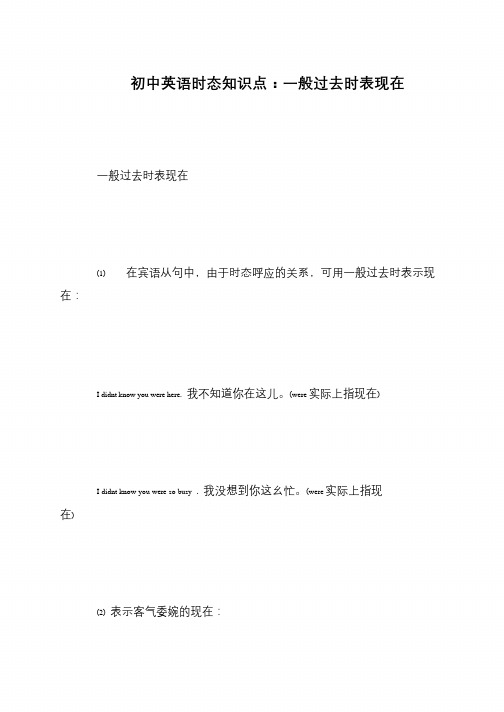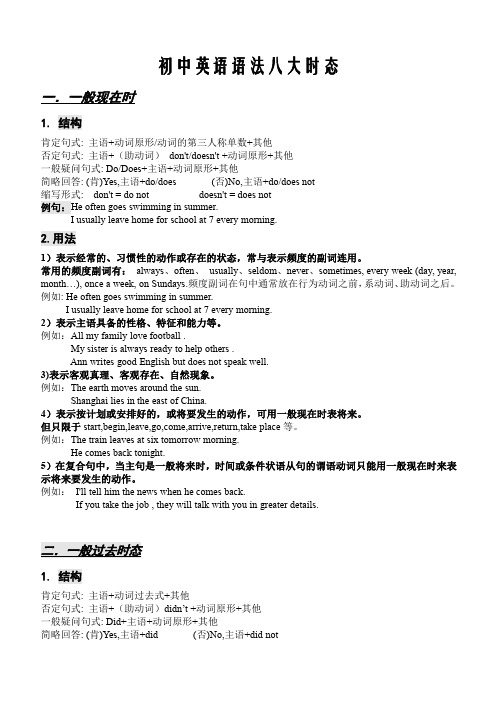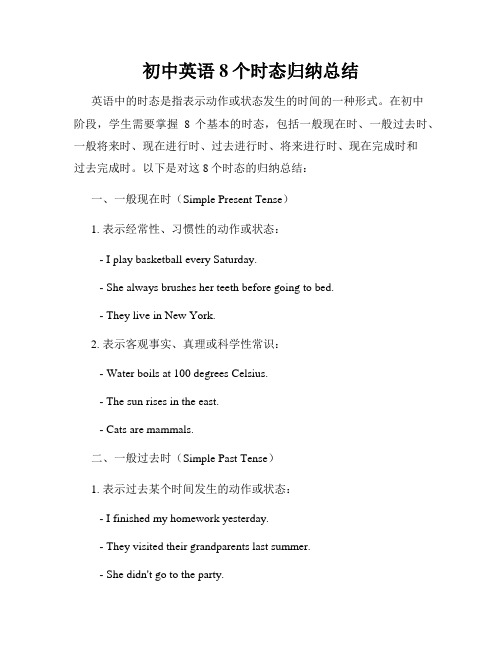初中英语知识点总结:一般过去时
初中英语 一般过去时态知识点总结

初中英语一般过去时态知识点总结
XXX昨天她步行去学校。
XXX XXX.上周末他们打篮球。
2)否定式:did + not +动词原形。
如:
She did not walk to school XXX.昨天她没有步行去学校。
They did not play XXX XXX.上周末他们没有打篮球。
3)疑问式:Did +主语+动词原形?如:
Did she walk to school XXX?昨天她步行去学校了吗?
Did they play basketball last XXX?上周末他们打篮球了吗?
一般过去时是用来表示过去发生的动作或存在的状态的时态。
例如,昨天她生病了,上周下过雪等。
此外,一般过去时还可以用来表示过去经常或反复发生的动作,例如他们上学期每周去看一场电影,那时她通常起得很早等。
在条件、时间状语从句中也可以用一般过去时来代替过去将来时。
一般过去时的谓语部分构成比较简单,除了be动词外,
其余动词的过去式都是谓语动词。
be动词的肯定式为
was/were+表语,否定式为was/were+not+表语,疑问式为将
was或were提前到句首。
情态动词的肯定式为情态动词的过去式+动词原形,否定式为情态动词的过去式+not+动词原形,疑问式为将情态动词的过去式提前到句首。
行为动词的肯定式为动词的过去式,否定式为did+not+动词原形,疑问式为
Did+主语+动词原形。
初中英语一般过去时总结(28张)

第二部分 一般过去时的构成
7
Language points
二、一般过去时的构成 1.be动词在一般过去时中的变化: (1)am和is在一般过去时中变为______. 用于第________人称单数。 例如: 我九岁。 ___________________________________________. 我去年九岁。 ____________________________________________.
Homework
6. They _____ (make) a lot of toy planes last Tuesday. 7.1 _____ (fly) a kite with my brother in the park yesterday. 8. The mouse _____ (bite) the net and got out.
过去式 sat
swam drew sang could slept met read
Language points
动词原形 teach say begin give drink let spend
过去式 taught
said began gave drank
let spent
动词原形 ride run buy keep drive mean bring
一般过去时
contents
1 一般过去时的概念及用法
2 一般过去时的构成
3 动般过去时的概念及用法
3
Language points
一、一般过去时的概念及作用
1.一般过去时表示过去某个时间发生的动作或存在的状态,常和表示过 去的时间状语连用。 例如: My mother's handbag was on the sofa just now. We went to the farm last week.
初中英语时态知识点:一般过去时表现在

I wondered if you were free this evening.不知您今晚是否有空。
I thought you might like some flowers.我想您也许想要些花。
【注】能这样有的动词主要限于want,wonder,think,hope,intend等少等少数结构后接从句的情形,其中些结构后面的句子还可用一般过去时表
示将来:
Idrather you come next Monday.我宁愿你下周星期一来。
另外表主观想法的虚拟条件句也用一般过去时表示现在:
IfIhadthemoneynowIdbuyacar.假若我现在有钱,我就买辆小汽
车。
初中英语时态知识点:一般过去时表现在
一般过去时表现在
(1)在宾语从句中,由于时态呼应的关系,可用一般过去时表示现
在:
I didnt know you were here.我不知道你在这儿。(were实际上指现在)
Ididntknowyouweresobusy.我没想到你这幺忙。(were实际上指现
在)
数动词。
(3)用于某些特殊结构中表示现在
Its time we started.我们该动身了。
I wish I knew his name.要是我知道他的名字就好了。
Id rather you lived closer to us.我希望你能住得离我们近点。
【注】该用法主要用于itstime,Iwish,Idrather,ifonly,asif,asthough
初中英语语法八大时态总结(完整版)

初中英语语法八大时态一.一般现在时1. 结构肯定句式: 主语+动词原形/动词的第三人称单数+其他 否定句式: 主语+(助动词) don't/doesn't +动词原形+其他 一般疑问句式: Do/Does+主语+动词原形+其他 简略回答: (肯)Yes,主语+do/does (否)No,主语+do/does not 缩写形式: don't = do not doesn't = does not 例句:He often goes swimming in summer. I usually leave home for school at 7 every morning.2.用法1)表示经常的、习惯性的动作或存在的状态,常与表示频度的副词连用。
常用的频度副词有: always、often、 usually、seldom、never、sometimes, every week (day, year, month…), once a week, on Sundays.频度副词在句中通常放在行为动词之前, 系动词、 助动词之后。
例如: He often goes swimming in summer. I usually leave home for school at 7 every morning. 2)表示主语具备的性格、特征和能力等。
例如:All my family love football . My sister is always ready to help others . Ann writes good English but does not speak well. 3)表示客观真理、客观存在、自然现象。
例如:The earth moves around the sun. Shanghai lies in the east of China. 4)表示按计划或安排好的,或将要发生的动作,可用一般现在时表将来。
初一英语英语一般过去时知识点总结含解析

初一英语英语一般过去时知识点总结含解析一、初中英语一般过去时1.John and I ________ to visit his grandparents last Sunday afternoon.A. goB. wentC. will goD. have gone【答案】 B【解析】【分析】考查动词时态。
根据last Sunday知道用一般过去时,故选B。
2.He almost fell down. But he _____.A. didn'tB. doesn'tC. won't【答案】 A【解析】【分析】句意:他几乎摔倒,但是他没有。
前句动词fell是fall的过去式,说明句子用的一般过去时态,后句也还是对那件事的描述,还是用一般过去时态,否定:动词前面加didn't,同时把动词变为原形。
故选A。
3.A bridge ________over the river last year.A. buildsB. builtC. was builtD. is built【答案】 C【解析】【分析】句意:去年河上建了一座桥。
主语是谓语的执行者时,用主动语态,主语是谓语的承受者时,用被动语态。
a bridge是谓语build的承受者,用被动语态;表示在last year发生的过去动作,用一般过去时态,故选C。
4.As we all know, the Silk Road _______ China to the west in ancient times.A. connectsB. connectedC. will connectD. is connecting【答案】B【解析】【分析】句意:众所周知,在古代丝绸之路是连接中国和西方的。
In ancient times“在古代”,因此要用一般过去式。
结合句意,故选B。
【点评】考查动词时态。
5.— Where did you go last weekend?— I to the Great Wall.A. goB. wentC. will goD. have gone【答案】B【解析】【分析】句意:——上个周末你去哪里了?——我去长城了。
初中英语8个时态归纳总结

初中英语8个时态归纳总结英语中的时态是指表示动作或状态发生的时间的一种形式。
在初中阶段,学生需要掌握8个基本的时态,包括一般现在时、一般过去时、一般将来时、现在进行时、过去进行时、将来进行时、现在完成时和过去完成时。
以下是对这8个时态的归纳总结:一、一般现在时(Simple Present Tense)1. 表示经常性、习惯性的动作或状态:- I play basketball every Saturday.- She always brushes her teeth before going to bed.- They live in New York.2. 表示客观事实、真理或科学性常识:- Water boils at 100 degrees Celsius.- The sun rises in the east.- Cats are mammals.二、一般过去时(Simple Past Tense)1. 表示过去某个时间发生的动作或状态:- I finished my homework yesterday.- They visited their grandparents last summer.- She didn't go to the party.2. 表示过去的经历或习惯:- When I was young, I often went swimming. - He always ate breakfast at 8 o'clock.三、一般将来时(Simple Future Tense)1. 表示将来要发生的动作或事件:- I will go shopping tomorrow.- They are going to have a picnic next week. - She won't be late for the meeting.2. 表示将来的打算或意愿:- I am going to be a doctor when I grow up.- We will help you with your project.四、现在进行时(Present Continuous Tense)1. 表示现在正在进行的动作:- We are studying English at the moment.- He is playing soccer with his friends.- They aren't watching TV right now.2. 表示现阶段的趋势或变化:- The population is increasing rapidly.- More and more people are using smartphones.五、过去进行时(Past Continuous Tense)1. 表示过去某一时间段内正在进行的动作:- I was reading a book when the phone rang.- They were cooking dinner at 7 o'clock.2. 表示过去的同时发生的两个动作:- She was listening to music while doing her homework.六、将来进行时(Future Continuous Tense)1. 表示将来某一时间段内正在进行的动作:- Tomorrow, they will be flying to Paris.- I will be waiting for you at the station.2. 表示将来的预测或计划:- This time next month, I will be studying for my exams.七、现在完成时(Present Perfect Tense)1. 表示过去某一时间发生的动作对现在造成的影响或结果: - I have finished my homework, so I can watch TV now.- She has already eaten lunch.2. 表示过去某一时间内多次发生的动作:- We have visited that museum several times.八、过去完成时(Past Perfect Tense)1. 表示过去某一时间点之前已经完成的动作:- By the time they arrived, we had already left.- I had finished my work before the deadline.2. 表示过去的顺序或先后关系:- She realized that she had forgotten her keys after she locked the door.以上是初中英语的8个时态的归纳总结。
初中英语语法——一般过去时知识点总结归纳

初中英语语法——一般过去时知识点总结归纳一般过去时——表示过去发生的动作或事件。
概念: 1) 表示过去某个时间发生的动作或存在的状态。
常和表示过去的时间状语连用. 如: yesterday , last week , in 1998 , two days ago 等。
如: I went to a movie yesterday. 我昨天去看了一场电影。
2) 也可表示过去经常或反复发生的动作。
如: He always went to work by bike last week。
构成: (1) 主语+ be (was / were ) +……(2) 主语+ 实义动词过去式+【解析】常和表示过去的时间状语连用,如yesterday, last night, the day before yesterday, 3 days ago...含有be动词的句子,将be动词变为过去式。
am, is的过去式为was, are的过去式为were:I was at the butcher's.You were a student a year ago.The teacher was very beautiful ten years ago.★变否定句在be动词后面加notI was not at the butcher's.You were not a student a year ago.The teacher was not very beautiful ten years ago.★变疑问句将be动词移动到句首Were you at the butcher's?Were you a student a year ago?Was the teacher very beautiful ten years ago?★肯定回答否定回答Yes, I was. / No, I was not.Yes, you were. / No, you were not.Yes, he/she was. / No, he/she was not.★特殊疑问句What did you do?(必背)不含有be动词的句子,将动词变为过去式:I finished my homework yesterday.The boy went to a restaurant.The Sawyers lived at King Street a year ago.★变疑问句在句首加did,动词变为原型Did you finish your homework yesterday?Did the boy go to a restaurant?Did the Sawyers live at King Street a year ago?★变否定句在主语和动词之间加did notI did not finish my homework yesterday.The boy did not go to a restaurant.The Sawyers did not live at King Street a year ago.★肯定回答及否定回答Yes, I did. / No, I didn't.Yes, he did. / No, he didn't.Yes, they did. / No, they did not.。
初中英语知识点总结一般过去时

初中英语知识点总结一般过去时一、一般过去时的用法:一般过去时表示过去发生或完成的动作、存在的状态或做过的事情。
1.表示过去一些时间发生的动作或存在的状态:- I played soccer yesterday.(我昨天踢足球。
)- He lived in Beijing when he was young.(他年轻时住在北京。
)2.表示过去的习惯性动作或经常发生的动作:- When I was a child, I always went to bed early.(我小的时候总是早睡。
)3.表示过去的客观事实或真理:- The dinosaurs died out millions of years ago.(恐龙在几百万年前灭绝了。
)- She didn't know the answer to the question.(她不知道问题的答案。
)4.表示过去的心理活动、愿望或打算等:- I wanted to be a doctor when I was young.(我年轻时想做一名医生。
)- He hoped to go to the park with his friends.(他希望和朋友去公园。
)二、一般过去时的构成:1.肯定句式:主语+动词的过去式+其他成分- I played basketball last week.- She lived in London for three years.- They watched a movie at the cinema yesterday.2.否定句式:主语 + did not / didn't + 动词原形 + 其他成分- I didn't play basketball last week.- She didn't live in London for three years.- They didn't watch a movie at the cinema yesterday.3.疑问句式:Did + 主语 + 动词原形 + 其他成分?- Did you play basketball last week?- Did she live in London for three years?- Did they watch a movie at the cinema yesterday?三、一般过去时的特殊情况:1.动词过去式的构成规则:a) 一般情况下,动词的过去式在词尾加上-ed:walk - walked(走)talk - talked(说话)play - played(玩)b)以字母e结尾的动词,在词尾只加-d:dance - danced(跳舞)c) 以辅音字母+y结尾的动词,将y变为i,再加-ed:study - studied(学习)d) 以重读闭音节结尾,末尾只有一个辅音字母的动词,双写这个辅音字母,再加-ed:stop - stopped(停止)plan - planned(计划)2.部分动词的过去式不规则,需要记忆:be - was / were(是)have - had(有)go - went(去)do - did(做)write - wrote(写)see - saw(看见)eat - ate(吃)drink - drank(喝)take - took(拿)四、表示一般过去时的时间状语:1.表示过去一些时间的状语:yesterday(昨天)last week(上星期)two days ago(两天前)2.表示过去的时间段的状语:when I was young(我年轻时)in my childhood(在我童年时)in the past(在过去)3.表示过去曾经做过的动作的状语:once(一次)五、注意事项:1. 一般过去时的句子中,谓语动词要用过去式,但be动词有时会用was或were。
- 1、下载文档前请自行甄别文档内容的完整性,平台不提供额外的编辑、内容补充、找答案等附加服务。
- 2、"仅部分预览"的文档,不可在线预览部分如存在完整性等问题,可反馈申请退款(可完整预览的文档不适用该条件!)。
- 3、如文档侵犯您的权益,请联系客服反馈,我们会尽快为您处理(人工客服工作时间:9:00-18:30)。
知识点总结
一般过去时表示过去某个时间里发生的动作或状态;过去习惯性、经常性的动作、行为;过去主语所具备的能力和性格。
我们可以先记一下一般过去时口诀:
一般过去时并不难,表示过去动作、状态记心间。
动词要用过去式,时间状语句末站。
否定句很简单,didn't 站在动词原形前,其它部分不要变。
一般疑问句也好变,did放在句子前,主语、动原、其它部分依次站。
特殊疑问句也简单,疑问词加一般疑问句记心间。
最后一条请注意,动词过去式要牢记。
一、基本结构
1. 肯定句形式:主语+动词过去式+其他
否定句形式:①was/were+not; ②在行为动词前加didn't,同时还原行为动词
一般疑问句:①was/were提到句首;②Did+主语+do+其他?
例句She often came to help us in those days. I didn't know you were so busy.
2. 行为动词的一般过去式。
A. 规则动词的变化规则:
1、直接加ed:work—— worked look——looked play——played,
2、.以e结尾的单词,直接加d:live ——lived hope——hoped use——used,
3、以辅音字母+y结尾的,变y为i加ed:study—— studied carry——carried
4、以元音字母+y结尾的,直接加ed:enjoy ——enjoyed
5、以重读闭音节结尾的,双写最后的辅音字母+ed:stop—— stopped
plan——planned
B. 规则动词过去式的发音:
在清辅音后读/t/,在元音和浊辅音后读/d/,在辅音/t/,/d/后读/id/。
C. 不规则动词变化需参看不规则动词表逐一熟记。
(一般和过去分词一起记忆)。
二、一般过去时的基本用法:
1. 通常表示过去发生的而现在已经结束的事件、动作或情况。
Eg. Sam phoned a moment ago.
I got up at eight this morning.
2. 还可以表示刚刚发生的事情而没说明时间。
Eg. Did the telephone ring?
Who left the door open?
3. 也可以表示过去的习惯性动作。
Eg. I smoked 40 cigarettes a day till I gave up.
4. 与一般过去时连用的时间状语:
yesterday, last week/Sunday/year, …ago, just now…
eg. I met Lily yesterday. I went to Dalian last summer.
I was a good student 5 years ago. He had dinner just now.
常见考法
对于一般过去时的考查,多以单选、句型转换或词语运用的形式考查学生在具体语境中灵活运用时态的能力。
在考试中,会让大家判断是否该用一般过去时,或动词过去式的正确变化,或一般过去时的句型构成。
典型例题1:1. Xiao Lin went fishing this morning.(改为一般疑问句)
解析:这是一道句型转换题,考查到同学们对一般过去时的句型构成的掌握。
一般过去时的
一般疑问句句型构成为:Did+主语+do+其他?,即句首加Did,句中过去式还原。
答案:Did Xiao Lin go fishing this morning?
误区提醒
有些句子,虽然没有表示过去确定时间的状语,但实际上是指过去发生的动作或存在的状态的话,也要用过去时,这一点,我们中国学生往往出错,要特别注意!
典型例题1:I didn''t know you (be)in Paris.
解析:题干意思是“我不知道你在巴黎”。
因为在说话时,我已经知道你在巴黎了。
这句话指的是说话之前,所以只能用过去时表示。
实际上,这句话暗指:But now I know you are here.
答案:were。
